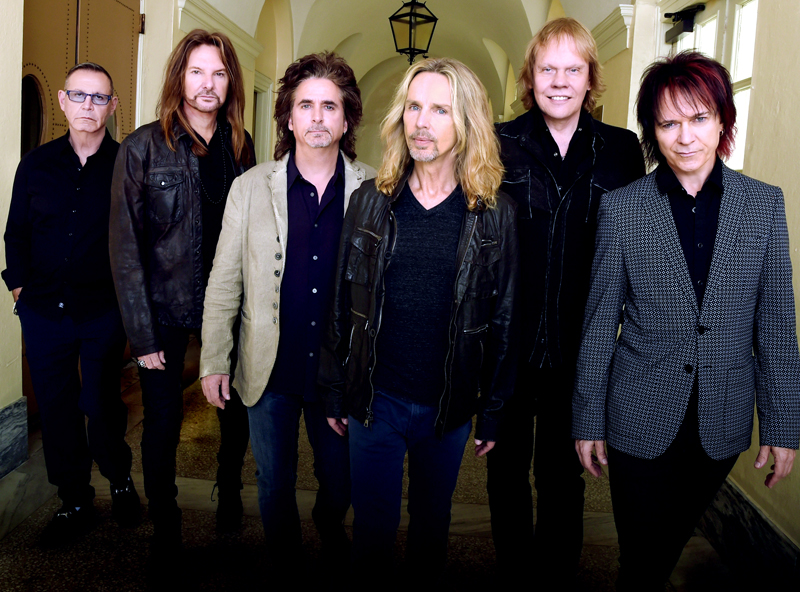By Peter Lindblad

Accustomed to flying solo, Lawrence Gowan was doing just fine on his own.
Across his native Canada, where he held packed houses in the palm of his hand with his captivating progressive-rock and pop artistry, Gowan was a headliner. He’d already played the famous Montreal Forum – home of hockey’s Montreal Canadians – and Massey Hall, Toronto’s answer to Carnegie Hall, with his name in lights listed at the top of the marquee.
The charismatic and classically trained Gowan hadn’t opened for anybody in 14 or 15 years, if memory serves. Supertramp was the last act he’d supported. And yet, here was in the ‘90s, being asked to go on before the legendary Styx.
The two acts were booked to play a theater on the same night – Gowan with his stripped-down solo act, and Styx with its heady rush of arty, theatrical rock ‘n roll power and might. It didn’t seem to Gowan that they were a good match. Despite his misgivings, Gowan relented.
“So, believe it or not, during that show, I remember watching, and it was the first time I had ever seen Styx, and I thought their show was excellent,” said Gowan. “It really exceeded my expectations … and I remember remarking to my wife, and my cousins who had come over from Ireland, I said, ‘I’d never be in a band, but if I was in a band, I’d probably fit into this one,’ and they laughed and said, ‘Yep, you would.’”
That off-the-cuff remark would prove prescient. Two years later, Gowan picked up the phone and was asked to join Styx.
“It was a call to the universe, and the vibe got picked up,” said Gowan.
The bat signal is going out to concertgoers in Wisconsin once again, as Styx (https://styxworld.com/) is scheduled to perform in Elkhorn at the Walworth County Fair. Saturday, Sept. 2. To Gowan, a Styx show is a religious awakening, a dazzling spectacle of sound and vision.
“Well, this is the thing,” said Gowan, keyboardist and vocalist with Styx since 1999. “We seem to night after night bring big smiles to a sea of faces in the thousands that have their arms in the air, enthralled with what they’ve just gone through at a rock show and that is very, very inspiring basically, and we have a great time onstage providing that. Mostly, we all wanted to do this so badly when we were young. We all have that in common. And to be doing that onstage at the level we can pull off night after night is just a joy. And the further deepening of that, of course, is because music is a language and to communicate that to people en masse it’s just one of the most life-affirming experiences that you can possibly connect to, and we’re very much addicted to it.”
Gowan’s relationship started with Styx in 1997, when he supported the band for shows at Montreal’s Molson Centra and Quebec’s Colisee. It was Tommy Shaw, Styx’s guitarist, vocalist and multi-instrumentalist, who rang Gowan to recruit him to replace front man Dennis DeYoung.
“My initial feeling of it was that it was driven a lot by the faith that J.Y. (James Young) and Tommy – and Chuck (Panozzo) later on, but Chuck was ill at that time … the kind of faith and assurance they had that I could do it,” said Gowan. “I kind of convinced myself that this could work.”
Gowan recalls stepping onstage with Styx for the very first time. It was a baptism of fire.
“That very first show I do remember we opened up with … we had a new album out back then called Brave New World,” said Gowan. “I think we opened with ‘Brave New World’ and went into ‘Blue Collar Man’ and then segued into ‘Grand Illusion,’ and I could see that the crowd was really enthusiastic already with the first couple of songs. And we started ‘Grand Illusion,’ and on vocals, I had drawn the first assignment. It dawned on me that the whole band was convinced we could do this, [but] I’m about to sing this to an audience that had never heard anyone else sing this song obviously with Styx. So, there was a moment just when I thought, in the next four minutes, I’m going to know how long or how short the future of this will be, and that happened.”
Gowan and Styx soon had their answer.
“By the end of the song … people had responded the same way they had to the other songs … Tommy came over with a big grin on his face, and they wanted the band to continue and I felt suddenly in that moment that it is going to continue and I think if we really lean into it hard, we might get to do this the next four or five years,” said Gowan. “And that’s what I remember initially. Then, that’s turned into 25 years.”
For Gowan, it’s a warm memory, one that he’ll always cherish. Back then, there was a sense in the Styx camp that the band was on the cusp of a renaissance. Up to that point, the ‘90s had been tough on classic-rock bands, like Styx, who emerged from Chicago in the ‘70s, with hit singles like “Lady” and “Lorelei” setting the stage for 1977’s The Grand Illusion album to take North America by storm. Pieces of Eight followed, birthing the amplified juggernauts “Renegade” and “Blue Collar Man (Long Nights).” Then came 1979’s Cornerstone, yielding the successful ballad “Babe.”
Nothing could have prepared Styx for what was about to happen, however. In 1981, they released the concept album Paradise Theatre, which shot to No. 1 in the U.S. and Canada on the strength of songs like “The Best of Times” and “Too Much Time on My Hands,” among others. Kilroy Was Here was released in 1983, and it charged up the charts, carried aloft by lead single “Mr. Roboto.”
Styx had peaked, however, and the lean years that followed would see the band’s commercial fortunes fall.
Around the same period, Gowan had conquered Canada, but in America, he was a virtual unknown. Even traveling with one of the biggest acts in the world couldn’t break Gowan in the States, as he opened for Tears For Fears in 1985 on the Songs From the Big Chair tour.
“We did 38 cities,” said Gowan. “They were like No. 1 in America, and my solo album was No. 1 in Canada during that time. Ray Danniels, who was the manager of Rush and myself, that’s how he got me on that tour through his connections here. So, he locked horns with CBS Records in New York, and they moved the goal posts … every time an album went platinum, they would go, ‘Oh well, when it goes two times platinum, we’ll release it here … when it goes four times platinum, we’ll release it here.’ So, it was a frustrating time, and I thought, well, America’s never going to be part of my musical life anyway.”
That all changed when he hooked up with Styx, who felt a sea change was about to occur.
“Well, we felt that the bands of the ‘70s … the bands of the classic rock era, the ‘70s, early ‘80s were called that, their shelf life seemed to be really waning by the late ‘80s and the early ‘90s,” said Gowan. “And in the late ‘90s, after 1995, the notion that some of these songs were still around … they were 20 years old at that point and they were still around. I remember being in England in 1998 with them, and my publicist who worked with a lot of those artists said, ‘I’m going to put you on the Brian May tour next year and we may even add a couple of Queen songs to the show.’ Even then I began to think, “I wonder …”
The tide was turning. Gowan and Styx could feel it in their bones.
“You got the sense this big, colossal train was pulling back into the station, to use that kind of metaphor,” said Gowan. “It had kind of left the station a long time ago and it was coming back in, and there was kind of a wave of that. And when I went to see Tommy and JY, I could tell I was already in the band at that point, we had checked our voices and all of that.”
The zeitgeist had rediscovered Styx, as nostalgic scenes in movies and TV breathed new life into the band – the most impactful being a mention in the Adam Sandler movie “Big Daddy.”
“It just seemed like they were right,” said Gowan. “This was not the time to do less … do more, and you think you could play a hundred shows in the next year. And I’d played 140 the year before, and I thought, ‘That’ll be easy’ … I don’t think they’d ever done more than 70 in a year.”
Creatively speaking, Styx has recorded some of its most ambitious work in recent years, with the aural spectacle of 2016’s The Mission and 2021’s uplifting and emotionally resonant Crash the Crown taking their respective places in the group’s hallowed canon. Although most of Crash the Crown was conceived before the Covid pandemic, it captures the anxiety and uncertainty of the period.
“We didn’t feel that way when we were writing the songs and recording them, but it was during 2020, somewhere around June or July, we began to realize … you know all the songs on that record, all but two were written prior to the lockdown, so it dawned us, ‘Wow! These songs, they all kind of speak to the experience of what we’re going through right now. We’ve got to finish this record somehow,’” said Gowan.
Working separately in studios in different cities, with Gowan stuck in Canada due to travel restrictions, Styx pieced together Crash the Crown, which contains messages of hope and unity.
“They could have been written today,” said Gowan. “They just seemed to speak clearly … so there was a confidence, a feeling that we were on the pulse of something, and when you listen to the record, it seems right in sync with what’s going on. So, they said let’s release it the day you guys start playing live again. The first show back was June 16 of 2021, and they released it that day, and we were in St. Augustine, Florida, and 10 days later, the Billboard chart came out, the Rock Album Chart, and it was No. 1. We definitely jumped a few feet off the ground at that moment.”
Tears were shed as the audience gave Styx a hero’s welcome in the band’s triumphant return to the stage.
“Yeah, to say we were elated, is the only statement I can give you,” said Gowan. “It was really emotional, to be quite honest with you. People in the front row, you could see they were choked up. And that translated to us … the flood gates released. Like a dam bursting, it was really powerful. And I’ll tell you, it still is, in a different way. We’re two years on from that, from 2021, when things really started opening back up.”
Gowan sees being able to continue playing live as a gift, and he does what he can to give the best performance possible.
In his daily routine, Gowan will get a note on his hotel room door that says what time to meet with the rest of the group for the show. He gets his rest, does his exercises, plays around on an electric piano – it’s Joni Mitchell’s “Both Sides Now” the day of our interview – and he goes for a walk “to get the local flavor of the town.” Still, he says everything points to 8 o’clock, show time.
And these days, for Gowan, Shaw, Young, drummer Todd Sucherman, and bassist Ricky Phillips – as well as Chuck Panozzo, who’s known to make the occasional surprise appearance – every show is a mood elevator, and they’re grateful for every chance they get to go onstage as Styx. Live rock ‘n roll still excites Gowan like nothing else, and he believes crowds feel the same way.
“I mean it’s the kind of experience I’m drawn to in every way,” said Gowan. “And I think that is underscored by having gone through what we went through. It’s like delayed gratification. Being cut off from it for a period of time, you really truly appreciate it. You really feel the importance of it in their lives. What seems like simple entertainment has great, far-reaching effect.”

